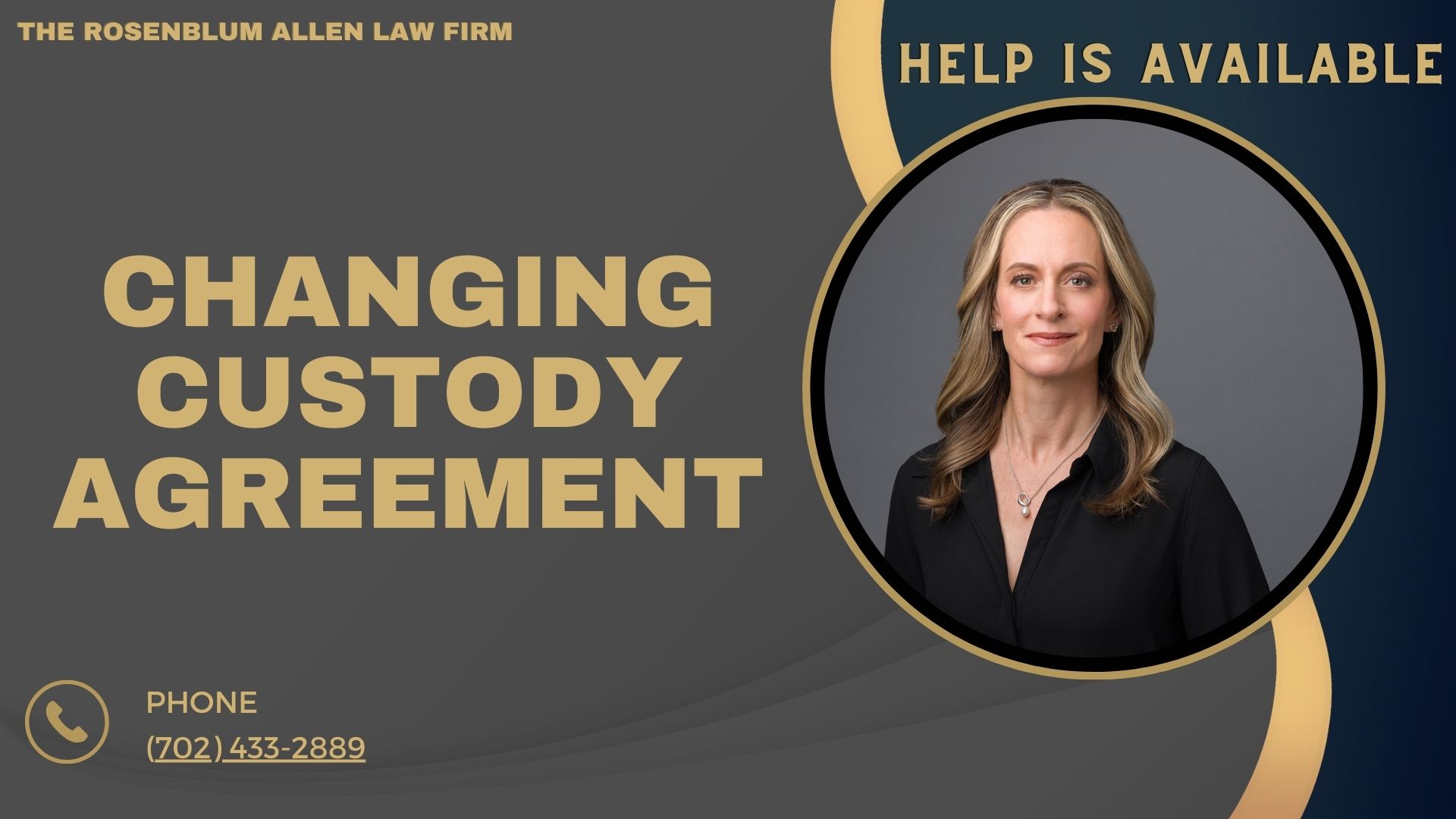Child custody agreements are not set in stone. As families evolve and circumstances change, it may become necessary to modify existing custody arrangements. While often necessary, this process requires careful consideration and adherence to legal procedures.
Why might you need to change a custody agreement? Perhaps your work schedule has shifted dramatically, or your child’s needs have changed as they’ve grown older. Maybe one parent is relocating, or there are concerns about the child’s well-being under the current arrangement. Whatever the reason, it’s crucial to approach this process with a clear understanding of what’s involved.
Reasons for Changing a Custody Agreement
Life is unpredictable, and what worked for your family when the original custody agreement was made may no longer be the best fit. Here are some common reasons why parents seek to modify custody arrangements:
Significant Changes in Circumstances
Major life events can necessitate a custody modification. These might include:
- A parent’s job loss or significant career change
- Remarriage of one or both parents
- Diagnosis of a severe illness
- Substance abuse issues
Child’s Evolving Needs
As children grow, their needs and preferences can change dramatically. This might involve:
- Educational requirements (e.g., a child needing specialized schooling)
- Extracurricular activities that conflict with the current schedule
- Developmental changes requiring different parenting approaches
Relocation of a Parent
When one parent needs to move a significant distance away, it can significantly impact the existing custody arrangement. Factors to consider include:
- The reason for the move
- How it will affect the child’s relationship with the other parent
- The potential benefits or drawbacks for the child
Changes in Parent’s Work Schedule or Lifestyle
Shifts in a parent’s availability can prompt the need for custody modifications:
- New job with different hours
- Return to school
- Changes in living situation
Concerns About Child’s Safety or Well-being
If there are genuine concerns about a child’s safety or overall well-being, this can be grounds for modifying a custody agreement. This might involve:
- Suspected abuse or neglect
- Exposure to dangerous individuals or environments
- Failure to meet the child’s basic needs
Remember, the court’s primary concern is always the child’s best interests. Any proposed changes to a custody agreement will be evaluated through this lens.

Legal Requirements for Modifying Custody
Changing a custody agreement isn’t as simple as deciding to change. There are legal hurdles to clear and specific requirements to meet. Let’s break down what you need to know:
Burden of Proof
When seeking a custody modification, the burden of proof falls on the parent requesting the change. This means you’ll need to demonstrate to the court that:
- There has been a significant change in circumstances since the last custody order
- The proposed modification is in the best interests of the child
It’s not enough to simply prefer a different arrangement. You must show that the current order no longer serves your child’s needs.
Best Interests of the Child Standard
Courts use the “best interests of the child” standard when making custody decisions. This encompasses a range of factors, including:
- The child’s physical and emotional needs
- The ability of each parent to meet those needs
- The child’s relationship with each parent
- The child’s ties to school, home, and community
- Any history of abuse or neglect
Time Restrictions on Modifications
Many jurisdictions impose time restrictions on how often custody orders can be modified. This is to promote stability for the child. For example, some states require that a certain period (usually 1-2 years) pass before a custody order can be modified unless there are exceptional circumstances.
Jurisdiction Considerations
Jurisdiction can become a complex issue if you and your co-parent live in different states. Generally, the state that issued the original custody order retains jurisdiction unless:
- Both parents and the child have moved out of state
- The original state declines jurisdiction
- There’s an emergency involving the child’s safety
Understanding these legal requirements is crucial as you consider modifying your custody agreement. It’s often helpful to consult with a family law attorney who can guide you through the specifics of your local laws and court procedures.

Steps to Change a Custody Agreement
So, you’ve decided it’s time to modify your custody agreement. Don’t worry; you’re not alone in this journey. Let’s break down the process into manageable steps.
Attempt to Negotiate with the Other Parent
Before diving into legal waters, try talking it out. Here’s how:
- Choose a neutral time and place
- Stay calm and focused on your child’s needs
- Be open to compromise
- Write down any agreements you reach
Remember, you both want what’s best for your child. A little communication can go a long way!
Mediation Options
If direct negotiation isn’t working, mediation might be your next stop. Think of it as a friendly referee for your discussions. Here’s what to expect:
- A neutral third party (the mediator) guides the conversation
- You and your co-parent discuss issues openly
- The mediator helps you find common ground
- It’s usually faster and cheaper than going to court
Many parents find mediation surprisingly helpful. Give it a shot – you might be pleasantly surprised!
Filing a Petition for Modification
If negotiation and mediation don’t work, it’s time to involve the court. Here’s a quick rundown:
- Prepare your petition (your lawyer can help with this)
- File it with the court that issued your original custody order
- Pay the filing fee (or ask for a fee waiver if you can’t afford it)
- Serve the papers to your co-parent
- Wait for their response
Don’t be intimidated by the legal jargon. Your lawyer or the court clerk can guide you through this process.
Gathering Evidence and Documentation
Now comes the detective work. You’ll need to prove why the change is necessary. Collect things like:
- School records
- Medical reports
- Witness statements
- Communication logs with your co-parent
- Proof of changes in circumstances (new job, relocation, etc.)
Think of it as telling your family’s story through documents. The more organized you are, the smoother this process will be.
Attending Court Hearings
Lights, camera, action! Well, not quite. Court hearings are more low-key, but they’re your chance to present your case. Here’s what to expect:
- Dress neatly and professionally
- Speak clearly and respectfully
- Stick to the facts
- Let your lawyer do most of the talking
- Be prepared for questions from the judge
Remember, the judge is there to help find the best solution for your child. They’re not picking sides, just looking for your little one’s well-being.

Types of Custody Modifications
Not all custody changes are created equal. Let’s explore the different types you might encounter:
Legal Custody Changes
This is about decision-making power. You might seek to:
- Change from joint to sole legal custody (or vice versa)
- Modify specific decision-making areas (e.g., education or healthcare)
- Add or remove conditions for joint decision-making
Physical Custody Adjustments
This deals with where your child lives. Modifications might include:
- Changing primary residence
- Adjusting the time split between parents
- Addressing specific living arrangements (e.g., during holidays)
Visitation Schedule Alterations
Life changes, and so might your visitation schedule. You could be looking at:
- Changing weekday or weekend arrangements
- Modifying holiday and vacation schedules
- Adjusting pick-up and drop-off times or locations
Decision-Making Authority Modifications
Sometimes, you need to tweak who makes what decisions. This could involve:
- Reallocating decision-making in specific areas
- Adding requirements for consultation or agreement
- Changing the process for resolving disagreements
Remember, the goal is to create an arrangement that works best for your child and your family’s unique situation.
Factors Courts Consider When Changing Custody
When you’re in court, the judge isn’t just flipping a coin. They carefully weigh several factors to make the best decision for your child. Let’s break it down:
Child’s Preference (if age-appropriate)
As kids grow, their opinions start to matter more. But it’s not as simple as asking, “Mom or Dad?” The court considers:
- The child’s age and maturity
- Whether the Preference seems genuine or influenced
- The reasons behind the Preference
It’s a delicate balance between respecting the child’s wishes and ensuring their best interests.
Parent’s Ability to Provide for the Child
This isn’t just about who has the bigger house. The court looks at:
- Financial stability
- Emotional support
- Physical care
- Educational opportunities
It’s about creating a nurturing environment where your child can thrive.
Child’s Relationship with Each Parent
Quality over quantity is essential here. The court considers:
- Emotional bonds
- Time spent together
- Involvement in the child’s daily life
- Ability to meet the child’s needs
Remember, it’s not a popularity contest. It’s about fostering healthy relationships.

Related
What image would symbolize the impact of custody decisions on a child’s emotional state
What visual element could represent the stability and consistency in a child’s environment
What image would best illustrate the role of schools in supporting children through custody changes
What image would convey the idea of a child’s emotional journey post-custody decision
What image would effectively depict the balance between academic and emotional support for children in custody disputes
Impact on Child’s Education and Social Life
Stability is crucial for kids. The court looks at:
- School performance and consistency
- Friendships and community ties
- Extracurricular activities
- Support systems in place
The goal is to minimize disruption while allowing for positive changes.
History of Domestic Violence or Substance Abuse
Safety comes first. The court takes seriously any history of:
- Physical or emotional abuse
- Substance abuse issues
- Neglect or endangerment
The court may require supervised visitation or other protective measures if these issues are present.
Remember, the court’s primary concern is always your child’s best interests. They look at the big picture to create a safe, stable, and nurturing environment.
Temporary vs. Permanent Custody Modifications
Life can throw curveballs; sometimes, you must adjust your custody arrangement quickly. Let’s explore the different types of modifications you might encounter.
Emergency Custody Orders
Sometimes, you need to act fast to protect your child. Emergency custody orders are like a safety net for urgent situations. Here’s what you need to know:
- They’re temporary and short-term
- Used when there’s an immediate threat to the child’s safety
- Can be granted without the other parent present
- Usually, it lasts until a full hearing can be held
Examples of when you might need an emergency order:
- Suspected abuse or neglect
- A parent’s sudden incapacitation (like hospitalization)
- Threat of child abduction
Remember, these are serious measures. Only use them in genuine emergencies.
Temporary Modifications During Legal Proceedings
Think of these as a trial run. While you’re working out the details of a permanent change, the court might grant a temporary modification. This could happen:
- During a divorce process
- While evaluating a request for a permanent change
- To test out a new arrangement before making it official
These modifications help ensure your child’s needs are met during transitions.
Long-term Custody Changes
Sometimes, you need to make a significant change that sticks. Long-term modifications are more permanent and require a higher standard of proof. You’ll need to show:
- A substantial change in circumstances
- That the change is in the child’s best interests
- Evidence to support your request
These changes could involve:
- Switching primary custody from one parent to another
- Significantly altering the visitation schedule
- Changing decision-making authority
Remember, the court’s priority is always your child’s well-being.

Impact of Relocation on Custody Agreements
Moving is stressful enough, but when custody is involved, it gets even trickier. Let’s break down what you need to know.
Notice Requirements for Moving
First things first: you can’t just pack up and go. Most states have laws about notifying your co-parent. Here’s a general guide:
- Give written notice (usually 30-90 days in advance)
- Include details like the new address and moving date
- Explain how this might affect the current custody arrangement
Failing to provide proper notice can have serious consequences, so don’t skip this step!
Distance Considerations
How far is too far? It depends. Courts often consider:
- Whether the move will significantly impact the current arrangement
- If it’s possible to maintain frequent and continuing contact with both parents
- The child’s age and ability to travel
A move across town might not be a big deal, but crossing state lines? That’s a different story.
Effect on Visitation Schedules
When one parent moves, the old schedule might not work anymore. You might need to get creative:
- Longer but less frequent visits
- Using school breaks for extended time together
- Virtual visitation through video calls
The goal is to maintain strong relationships with both parents, even at a distance.
Out-of-state Moves and Jurisdiction Issues
Crossing state lines adds another layer of complexity. You’ll need to consider:
- Which state has jurisdiction over custody matters
- How to enforce custody orders across state lines
- The Uniform Child Custody Jurisdiction and Enforcement Act (UCCJEA)
If you’re planning an out-of-state move, it’s crucial to consult with a lawyer who understands interstate custody issues.

Modifying Child Support Along with Custody
When custody changes, child support often needs to change too. It’s like a domino effect.
Relationship Between Custody and Support
Custody and support go hand in hand. Here’s why:
- The amount of time each parent spends with the child affects support calculations
- Changes in custody can lead to changes in each parent’s financial responsibilities
It’s all about ensuring the child’s needs are met, regardless of which parent they’re with.
Recalculating Child Support Payments
When custody changes, it’s time to break out the calculator. Here’s a simplified version of how it works:
- Determine each parent’s income
- Calculate the primary support obligation
- Adjust based on the new custody arrangement
- Factor in additional expenses (like healthcare or education)
Many states have online calculators to help you estimate new support amounts.
Income Considerations in Custody Modifications
Money matters, but it’s not everything. Courts look at the big picture:
- Each parent’s earning capacity (not just current income)
- Any special needs of the child
- The standard of living the child is accustomed to
- Other financial obligations of each parent
Remember, the goal is to provide for your child, not to punish or reward either parent.
Navigating custody modifications can be complex, but understanding these aspects can help you make informed decisions. Always keep your child’s best interests at heart, and don’t hesitate to seek professional help when needed. You’ve got this!

Conclusion
Remember, modifying a custody agreement isn’t about “winning” against your co-parent. It’s about adapting to life’s changes and creating the most nurturing environment for your child. While the process can be challenging, keeping your child’s well-being at the forefront will help guide your decisions.
If you’re considering changing your custody agreement, don’t hesitate to seek professional legal advice. An experienced family law attorney can help you understand your rights, navigate the legal system, and work towards the best possible outcome for your family.
Ultimately, successful co-parenting is about flexibility, communication, and always putting your child first. By approaching custody modifications with this mindset, you can create a positive, stable environment for your child, even as circumstances change.

Frequently Asked Questions
How long does it typically take to modify a custody agreement?
The timeline for modifying a custody agreement can vary widely depending on your situation. If both parents agree on the changes, it can be relatively quick – potentially just a few weeks. However, if the disagreement or the case is complex, it could take several months or even a year to resolve. Factors that can affect the timeline include court schedules, the complexity of your case, and whether mediation is required.
Can I change custody arrangements without going to court?
Yes, if both parents agree, it’s possible to change custody arrangements without court intervention. You can create a new parenting plan together and have it notarized. However, to make it legally binding and enforceable, it’s best to have the court approve and formalize the new agreement.
What if my ex-partner refuses to follow the new custody order?
You have several options if your ex-partner consistently violates the new custody order. You can file a motion for contempt of court, seek mediation to resolve the issues, or, in severe cases, request police intervention. Document all violations carefully, as this evidence will be crucial if you need to return to court.
How does remarriage affect custody agreements?
Remarriage itself doesn’t automatically change custody agreements. However, it could be considered a substantial change in circumstances that might warrant a modification, especially if it significantly impacts the child’s living situation or introduces new step-siblings.
Can my child refuse visitation with the other parent?
Generally, a child cannot legally refuse court-ordered visitation. However, if a child is consistently resistant, it may be worth exploring the reasons behind their reluctance. The court might consider their preferences in some cases, especially with older children. Always encourage your child to maintain a relationship with both parents unless there are safety concerns.
What if I need to change the custody schedule temporarily?
For temporary changes due to vacations, work commitments, or other short-term situations, it’s best to communicate directly with your co-parent. Try to be flexible and accommodating, keeping records of any agreed changes. Consider including provisions in your custody agreement if you anticipate needing regular temporary changes.
How does homeschooling affect custody agreements?
Deciding to homeschool a child can significantly impact custody arrangements, especially if both parents don’t agree. It may require modifying the custody agreement, affecting the child’s daily schedule and educational decision-making. Courts will consider whether homeschooling is in the child’s best interests.
Can custody agreements be modified for children with special needs?
Yes, custody agreements can and often should be modified for children with special needs. As the child’s needs evolve, the custody arrangement may change to ensure the best care and support. This might involve adjusting schedules, decision-making processes, or even the primary residence based on which parent best fits the child’s needs.
How do international relocations impact custody agreements?
International relocations can significantly complicate custody arrangements. They often require substantial modifications to existing agreements and may involve complex legal issues, including international law. If you’re considering an international move, it’s crucial to consult with a lawyer experienced in international family law well in advance.
What happens if one parent develops a severe illness?
If a parent develops a severe illness, it may be grounds for modifying the custody agreement. The court will consider how the disease affects the parent’s ability to care for the child and what arrangement would be in the child’s best interests. This might involve temporary or permanent changes to custody or visitation schedules.

Glossary
Affidavit: A written statement made under oath, often used as evidence in custody cases.
Best Interests of the Child: The primary standard courts use to decide custody and visitation arrangements.
Child Support: Financial payments made by a non-custodial parent to help cover child-raising costs.
Contempt of Court: The act of disobeying a court order can result in penalties for the violating party.
Custody Evaluation: An assessment conducted by a mental health professional to help determine the most suitable custody arrangement for a child.
De Facto Parent: A person who has acted as a parent to a child but may not have a biological or legal relationship.
Domiciliary Parent: The parent with whom the child resides in a joint custody arrangement.
Emergency Custody Order: A temporary order issued quickly to protect a child from immediate danger.
Guardian ad Litem: A court-appointed representative who advocates for the child’s best interests in custody proceedings.
Home Study: An evaluation of a parent’s living situation as part of a custody assessment.
Joint Custody: An arrangement where parents share responsibility for the child’s care and decision-making.
Legal Custody: The right to make important decisions about a child’s upbringing, including education, healthcare, and religious upbringing.
Mediation: A process where a neutral third party helps parents reach an agreement on custody and visitation issues.
Modification: A change to an existing custody order, typically requiring proof of a substantial change in circumstances.
Non-Custodial Parent: The parent who does not have primary physical custody of the child.
Parental Fitness: A parent’s ability to meet the child’s physical, emotional, and developmental needs.
Parenting Plan: A detailed agreement or court order outlining how parents will share responsibilities and time with their child.
Paternity: The legal establishment of a child’s biological father.
Physical Custody: The right to have a child live with you and be responsible for their day-to-day care.
Relocation: The act of moving a significant distance away, which can impact custody arrangements.
Shared Custody: An arrangement where parents have approximately equal parenting time.
Sole Custody: An arrangement where one parent has legal and physical custody of the child.
Split Custody: An arrangement where each parent has full custody of one or more of their children.
Supervised Visitation: visits between a parent and child overseen by a third party to ensure the child’s safety.
Temporary Custody: A short-term custody arrangement is implemented while a permanent custody decision is made.
Third-Party Custody: Custody granted to someone other than the child’s parents, such as grandparents or relatives.
Uniform Child Custody Jurisdiction and Enforcement Act (UCCJEA): This law helps determine which state has jurisdiction in interstate custody disputes.
Visitation: The time a non-custodial parent spends with their child as outlined in a custody agreement or court order.

Further Reading
To our valued readers, we understand that navigating family law matters can be complex and emotionally challenging. That’s why our lead attorney, Molly Rosenblum Allen, Esq, has dedicated her expertise to creating a suite of resources designed to guide you during these uncertain times. Below, you’ll find a list of informative resources that cover a wide range of topics related to custody and family law in Las Vegas. Whether you’re a father seeking to understand your rights, a grandparent looking to learn more about your role in a child’s life, or you’re facing the intricacies of a child custody battle, we’re here to help.
For comprehensive guidance on child custody matters, visit our dedicated page: Las Vegas Child Custody Attorney.
Fathers seeking information about their rights and how to avoid common mistakes can find valuable insights here: Fathers Rights.
If you’re facing challenges with supervised visitation, we provide key information on navigating these situations: Supervised Visitation.
Grandparents in Nevada seeking to learn about their rights will find this page helpful: Grandparents Rights Nevada.
We also offer advice for parents managing the complexities of long-distance co-parenting: Long Distance Co-Parenting.
Mothers concerned about the factors that could affect their custody battles should review: How a Mother Can Lose a Custody Battle.
For strategic insights tailored for Nevadans in the midst of a custody dispute, check out: Custody Battle Tips for Nevadans.
Discover what you should and shouldn’t say during child custody mediation to protect your interests: What Not To Say In Child Custody Mediation.
To understand the costs associated with hiring a custody lawyer, our resource provides clarity: How Much is a Custody Lawyer.
Learn about the different types of custody to better comprehend your options and rights: Types of Custody.
For parents and guardians curious about the age at which a child can decide to stop visitation, we offer guidance here: At What Age Can a Child Decide to Stop Visitation.
We encourage you to explore these resources to empower yourself with knowledge and make informed decisions about your family law matters. If you have any questions or need personalized assistance, please don’t hesitate to reach out to The Rosenblum Allen Law Firm

Offsite Resources You May Find Helpful
State of Nevada Legislature: Legislative history of Nevada custody law NRS 125C.0035.
FindLaw: FindLaw overview of Nevada child custody laws and modifying custody.
The Reason You Haven't Hired A Child Custody Attorney Yet
We’re ready to fight for the rights of your family if you hire us. We’re waiting to jump into action on the behalf of your family.

What's Next?
Thank you for taking the time to read through our comprehensive guide on child custody modifications. At The Rosenblum Allen Law Firm, we understand that changing custody agreements can feel overwhelming, but you don’t have to navigate this journey alone. If you’re ready to take the next step in modifying your custody agreement, I’m here to help. Call Molly and my experienced team at (702) 433-2889. We’ll discuss your situation and explain how we can assist you through this process.
Best regards,
Molly







